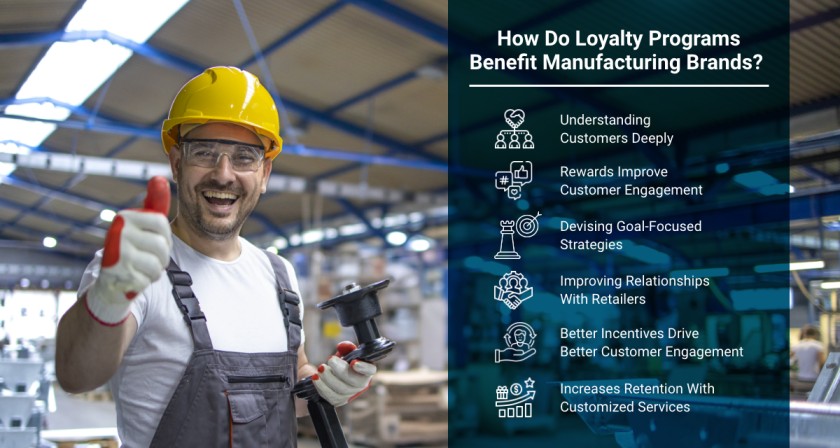How Manufacturing Loyalty Programs Help Brands Build Stronger Customer Connections
Manufacturing products are sold through multiple channels —suppliers, retailers, distributors, or e-commerce websites. Often the lack of direct interaction makes customers feel disconnected from the manufacturers. This results in poor customer relationships and negligible brand recall.
Loyalty programs have become an important channel to bridge this gap. A loyalty program can help manufacturers understand their customers better and create stronger engagement. 86% of customers agree that personalized communication with brands helps them make an informed decision.
Adding features like receipt scanning to these loyalty programs can help manufacturers collect first-party data. Receipt scanning allows manufacturers to collect extensive consumer insights. Brands can create customer-centric marketing campaigns with this valuable data.
Let’s look at the challenges manufacturing businesses face and how loyalty programs can help overcome them.
Challenges that hinder the growth of Manufacturing brands!
- Lack of communication with customers
Customer feedback is critical to understanding the quality and performance of a product. Manufacturers miss this crucial feedback from customers. This results in an inability to identify customers’ requirements and leads to negative consumer experiences. - Insufficient consumer data
Often manufacturers are not able to get critical information from customers. The only means of data collection for manufacturers is from POS systems —which is often insufficient. Understanding the purchase patterns, and buying behavior become a challenge. As a result, manufacturers cannot create effective promotional strategies or forecast demand. Low-quality customer data acts as a roadblock for manufacturers.
How do loyalty programs benefit manufacturing brands?
1. Understanding customers deeply
Getting consumer insights is easy for retailers. But for manufacturers, it becomes a challenging task. This is where a loyalty program can help.
“87% of customers readily share personal and activity details in exchange for more personalized rewards and brand experiences.”
Manufacturers can create & maintain a comprehensive database by rewarding customers for sharing data. With this customer database, manufacturers can access vital consumer analytics in real time.
The basic data typically collected by loyalty programs includes:
- Total active members:
This number reflects the number of engaged customers. To build stronger relationships, the brand should target a higher number of active members. - Customer Behavior:
Brands can understand customer behavior depending on what action they take. In addition, it helps to understand which strategies are driving customer actions and which are not. - Customer demographics:
Factors like location of purchase made age of customers etc. This data helps brands target the right audience and design marketing strategies to achieve better conversion rates. - Customer trends:
Purchase patterns can be identified, customer preferences can be analyzed & strategic decisions can be taken by brands backed with these valuable insights. A loyalty program provides different cuts of valuable data.
2. Rewards improve customer engagement
Customers are more likely to engage regularly with brands if they get rewards in return.
Incorporating gamification in the loyalty program also increases consumer engagement. Communicating regularly with customers allows brands to forecast demands, enhance promotional strategies, and improve consumer satisfaction. It also becomes easy for brands to devise strategies that can match customer expectations.
3. Improving relationships with Retailers
Even after direct connection with customers, the traditional supply chain involves retailers, distributors, and wholesalers. Creating loyalty program strategies targeted at these partners enables the manufacturing brand to ensure better relations. Therefore, loyalty programs focused on retailers, distributors, or manufacturers can significantly improve retail relationships.
“85% of business buyers agree that the experience provided by a manufacturer is equally important as the products.”
A more robust supply chain ensures that products are easily accessible to customers. Keeping that in context, manufacturers can create a loyalty strategy to increase engagement and provide more value to their partners.
4. Better incentives drive better customer engagement
A customer loyalty program is an excellent way to incentivize your customers. It is essential in the manufacturing industry to provide various incentives to keep customers interested in the products. Furthermore, offering valuable benefits to the customers makes them develop an emotional attachment with the manufacturer.
“55% of customers are ready to spend more in exchange for a better or personalized consumer experience.”
Loyalty programs for manufacturers are usually more successful than loyalty point schemes. When customers are rewarded for making purchases, they tend to spend more. Manufacturers can utilize the same with loyalty programs to increase revenue.
5. Increases retention
Creating a loyalty program is the key to increasing ROI for your business. Loyalty programs can help retain loyal customers. Loyal customers make frequent purchases, and the cost of selling to them is relatively low. Also, they can help bring referral business via word-of-mouth marketing.
To improve consumer loyalty, manufacturers must understand customers’ needs, provide them good services, offer attractive incentives & manage customer grievances effectively, etc.
With valuable data and a focused loyalty strategy, manufacturers can design loyalty programs that capture both wallet and mindshare. Loyalty programs help manufacturers understand customers better and cater to their needs with personalized experiences. Zinrelo offers a robust loyalty platform backed with data analytics and strategic consultations that ensure businesses can deploy the right strategies at the right time.


